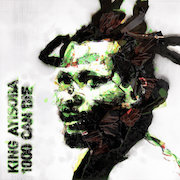You might be familiar with the ‘Africa is a country’ crypto-meme, likewise the blog of the same name, which serves as sarcastic rebuttal to Eurocentric ignoroids who treat a continent of 1.2 billion people as an indistinguishable mass. King Ayisoba, a latterday Ghanaian musical icon, is similarly sweeping on ‘Africa Needs Africa’, the opening track of 1000 Can Die, his fifth album. “Some of our leaders / Sell all their property,” he laments, in his trademark rasping vocal style; “Some of our people / Travel in Europe… they don’t want to come back!” It should be taken as read that Ayisoba – given name Albert Apoozore – is entitled to his broad brush in a way that non-Africans simply aren’t; moreover, he’s a pop star who trades in slogans and social commentary. Cutting a few corners is part of the job.
A majority of the lyrics on 1000 Can Die are sung in Ghanaian tongue, either Twi or Frafra, so if you’re not suitably versed you may want to know about the music. It’s wonderful stuff, centred on Ayisoba’s signature instrument, a two-stringed lute-type contraption called a kologo. Obviously limited in its sonic scope, our dude provides rhythm and melody lines alike to hypnotic and strangely groovy effect. ‘Grandfather Song’ is a red-raw kologo showcase: no embellishments, just two strings and an impassioned vocal. Even accounting for his rep as the kologo scene’s Real Music dude – that is to say, he got big without incorporating hip-hop or twinkly synths – this is brutally austere stuff, and thrilling for it. Conversely, a fleshed-out approach such as ‘Anka Yen Tu Kwai’ demonstrates that his splenetic croak-yelp can sit very nicely with a bumpin’ club bassline and extremely synthesised woodwind.
‘Wekana’ finds him teaming up with his label boss – and, perhaps, most significant European patron – Arnold de Boer, who you may know under his musical title Zea or as latterday frontman of The Ex. De Boer has released two previous King Ayisoba albums, Modern Ghanaians and Wicked Leaders, on his Makkum imprint, as well as a multi-artist compilation, 2016’s outstanding This Is Kologo Power!. (Check this Prince Buju cut from the latter for the killerest punk blues frying pan to the face you ever did hear.) The Dutchman’s only clear presence on the track seems to be a vocal line – one of several – “Sit down Annie / It’s your turn to eat,” but any road up it’s a wicked funky web of Afrobeat drums and insistent kologo bassline.
A birdsong-like flute, also prominent in ‘Wine Lange’, is threaded through a particularly booming percussive workout on the album’s title track, before Lee Scratch Perry tips up with a slightly weary-sounding vocal spot. (Aside: Christ on a bike, it’s nearly 20 years since the Beastie Boys paraded Scratch in similar fashion on an album of theirs, and he seemed like an old bugger then.) His lyrics, too, conflate “Ghanaians” and “Africans”, although I couldn’t speculate if he’s on-message or just riffing off the dome. ‘Dapagara’ hops eastwards to Nigeria, giving esteemed sax veteran Orlando Julius reign to blow sweet flavour over a canvas of loosely shaken percussion.
Album closer ‘Ndeema’ is an anomaly of sorts: a relatively delicate-sounding, trebly kologo part and a vocal that, for pretty much the only time on the album, exercises restraint and conveys timidity. It’s another string, no pun intended, to the bow of an album which has many thrilling dimensions. King Ayisoba’s four-strong band are a pulsing unit of clattering energy, even while I’ll cop to not really figuring out who’s playing what (oddly – and this might be a dialect/translation issue – every mention online of Abaadongo Adontanga’s chosen instrument, the dorgo, seems to relate to Adontanga himself).
I can barely imagine how slamming this stuff is when played live, and would have been informing you of such had visa issues not forced King Ayosoba to cancel his Bristol date two days before this album’s release. If you’re anywhere near him in the first three days of April, drop everything and go. Yeah, this part of the review will date very quickly; the album won’t a bit.


